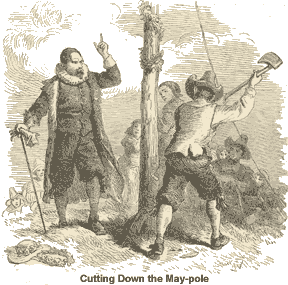Thomas Morton, a trader and lawyer, emigrated from England to the Plymouth Colony in the company of a Captain Wollaston in 1624. Unable to get along with the Pilgrim authorities, Wollaston, Morton and other settlers established their own small colony of Mount Wollaston at the present-day site of Quincy, Massachusetts. Then most of that community departed with the captain in 1626 in hopes of finding more hospitable surroundings in Virginia. Morton remained behind and renamed the village Mare Mount (Merry Mount), a clear indication of his priorities. Plymouth leaders did not welcome other settlements in their vicinity, particularly those that openly offended Pilgrim religious sensibilities. One event in particular brought tensions to the boiling point; it was later described by Morton in his own history of the settlement:
"The Inhabitants of . . . Mare Mount . . . did devise amongst themselves . . . Revels and merriment after the old English custome; (they) prepared to sett up a Maypole upon the festivall day . . . and therefore brewed a barrell of excellent beare . . . to be spent, with other good cheare, for all commers of that day. And . . . they had prepared a song fitting to the time and present occasion. And upon May day they brought the Maypole to the place appointed, with drumes, gunnes, pistols and other fitting instruments, for the purpose; and there erected it with the help of Salvages, that came thether to see the manner of our Revels. A goodly pine tree of 80 foot longe was reared up, with a peare of buckshorns nayled one somewhat neare unto the top of it: where it stood, as a faire sea mark for directions how to finde out the way to mine Hoste of Mare Mount."
(Morton, The New England Cannan, Book III, Chapter 14.)
This event is also recounted in Nathaniel Hawthorne's The Maypole of Merrymount. In 1628, Plymouth authorities dispatched Myles Standish to deal with their troublesome neighbor. Morton and his associates were too drunk to resist; he was taken into custody and exiled to a small nearby island to await transportation back to England. There he was supplied with provisions by sympathetic Indians and managed to escape on his own and return to England. He reappeared in Plymouth the following year and promptly ran into difficulties with the officials. His property was confiscated and he was again sent home.
While in England, Morton worked in support of those forces that were attempting to revoke the Plymouth charter. He also wrote his sometimes comic account of his adventures in New England, lampooning the claustrophobic environments of Plymouth and Massachusetts Bay.
Demonstrating life-long persistence, Morton returned to Massachusetts in 1643 and was promptly imprisoned in Boston. Following his release, he was exiled to Maine, where he remained for the rest of his life.
The harsh reaction of the Pilgrims to Morton was explained only in part by their abhorrence of the Maypole incident. They also were offended by his open ridicule of their society and his practice of conducting Anglican services at Merry Mount. Perhaps of even greater concern was the fact that Morton traded firearms for furs with the local Indians — a practice that the Pilgrims believed was their exclusive preserve.
A more thoughtful challenge to religious orthodoxy in early Massachusetts came from Anne Hutchinson and Roger Williams.
In 1628, Plymouth authorities dispatched Myles Standish to deal with their troublesome neighbor. Morton and his associates were too drunk to resist; he was taken into custody and exiled to a small nearby island to await transportation back to England. There he was supplied with provisions by sympathetic Indians and managed to escape on his own and return to England. He reappeared in Plymouth the following year and promptly ran into difficulties with the officials. His property was confiscated and he was again sent home.
While in England, Morton worked in support of those forces that were attempting to revoke the Plymouth charter. He also wrote his sometimes comic account of his adventures in New England, lampooning the claustrophobic environments of Plymouth and Massachusetts Bay.
Demonstrating life-long persistence, Morton returned to Massachusetts in 1643 and was promptly imprisoned in Boston. Following his release, he was exiled to Maine, where he remained for the rest of his life.
The harsh reaction of the Pilgrims to Morton was explained only in part by their abhorrence of the Maypole incident. They also were offended by his open ridicule of their society and his practice of conducting Anglican services at Merry Mount. Perhaps of even greater concern was the fact that Morton traded firearms for furs with the local Indians — a practice that the Pilgrims believed was their exclusive preserve.
A more thoughtful challenge to religious orthodoxy in early Massachusetts came from Anne Hutchinson and Roger Williams.